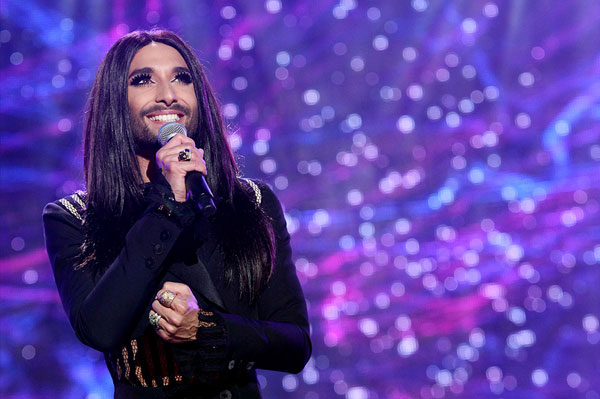Performing Sexual Identities
Nationalities on the Eurovision Stage
 Foto: shutterstock.com / raszkiewicz
Foto: shutterstock.com / raszkiewicz
Der Song Contest-Sieg von Conchita Wurst im Jahr 2014 entfachte den Diskurs über sexuelle Identitäten in weiten Teilen der österreichischen Gesellschaft. Die mdw greift dieses aktuelle Thema auf künstlerischer und wissenschaftlicher Ebene auf.
Die im Jahr 2014 gegründete Senatsarbeitsgruppe "queer_mdw" der mdw veranstaltet gemeinsam mit den Instituten für Volksmusikforschung und Ethnomusikologie sowie für Popularmusik am 7. März 2016 ein eintägiges internationales und interdisziplinäres Symposium mit dem Titel "Performing Sexual Identities. Nationalities on the Eurovision Stage".
Interdisziplinärer Austausch
Der Eurovision Song Contest als Plattform für vielfältige topographische Erscheinungsformen bietet sich für verschiedene wissenschaftliche Zugänge an. Sexuelle Identitäten und die Repräsentanz des "Nationalen" greifen manchmal ineinander. Invited Papers aus den Forschungsfeldern Queer Studies, Gender Studies, Zeitgeschichte, Politikwissenschaft und Ethnomusikologie bieten Raum zum interdisziplinären Austausch.
Gegenwart und Vergangenheit
So behandelt etwa Dafni Tragaki (Lektorin für Musikanthropologie an der Universität von Thessaly in Griechenland) mit dem Vortrag "A Song for Tolerance: Bodies and the Politics of Sensitivity" den Eurovisions-Triumph von Conchita Wurst.
Renée Winter (Historikerin und Mitarbeiterin der Österreichischen Mediathek) wiederum fokussiert in ihrem Vortrag "Who knows what comes tomorrow. Austria's early Eurovision Entries as Postnazistic Political Rehabilitation" auf die ersten österreichischen Beiträge beim Eurovision Song Contest vor dem Hintergrund der österreichischen NS-Vergangenheit.
"Mit dem Symposium will die mdw nicht nur einen wissenschaftlichen, sondern auch einen gesellschaftspolitischen Akzent setzen", so Gerda Müller, Vizerektorin für Organisationsentwicklung, Gender & Diversity.
Über die Vortragenden
- Thomas Hilder
Thomas Hilder is Postdoctoral Fellow in Musicology at the Grieg Academy, University of Bergen. After obtaining his PhD in ethnomusicology at Royal Holloway, University of London in 2010, he worked from 2011 to 2014 as a research assistant at the Center for World Music, University of Hildesheim. His research focuses on popular and traditional musics of Europe, particularly the Nordic countries, and draws on current debates within postcolonialism, digital media studies, gender theory and cultural memory studies. He is author of Sámi Musical Performance and the Politics of Indigeneity in Northern Europe (2015).
- Heiko Motschenbacher
Heiko Motschenbacher is Assistant Professor for English Linguistics at Goethe-University Frankfurt am Main and co-editor of the Journal of Language and Sexuality (John Benjamins). He recently held temporary professorships at universities in Bayreuth, Siegen, Braunschweig and Mainz and has published various ESC-related articles (for example, in the Journal of Language and Sexuality and Discourse & Society) and monographs (New Perspectives on English as a European Lingua Franca, John Benjamins, 2013; Language, Normativity and Europeanisation: Discursive Evidence from the Eurovision Song Contest, Palgrave Macmillan, in print).
- Dafni Tragaki
Dafni Tragaki studied ethnomusicology at Goldsmiths College (Univ. of London) and is currently a lecturer in music anthropology at the Univ. of Thessaly (Greece). She is the author of Rebetiko Worlds Ethnomusicology and Ethnography in the City (Cambridge Scholars Publishing, 2007) and the editor of Empire of Song. Europe and Nation in the Eurovision Song Contest (Scarecrow Press, 2013). Her recent research focuses on politics, performativity and affective economies in Greek popular music. She is the editor of Made in Greece. Studies in Greek Popular Music (forthcoming by Routledge).
- Dean Vuletic
As a Marie Skłodowska-Curie Fellow in the Department of East European History at the University of Vienna, Dr. Dean Vuletic has led the project Eurovision: A History of Europe through Popular Music. He is writing a book and he teaches a course on this topic. His research on Eurovision has been published in several books and journals and he has been widely interviewed about it in the European media. Dr. Vuletic was previously a Max Weber Post-Doctoral Fellow at the European University Institute in Florence. He was awarded his PhD in History from Columbia University in 2010, and he completed his MA and BA degrees in European Studies at Yale University and the Australian National University.
- Renée Winter
Renée Winter is a historian, scientific staff at the Österreichische Mediathek (Austrian National audio-visual archive) and University lecturer in Vienna and Salzburg. In 2012 she finished her dissertation on history programs dealing with Austria’s Nazi past on early Austrian television (1955 – 1970). At the Österreichische Mediathek she works as a researcher in the project The changing role of audio-visual archives as memory storages in the public space. Using the example of private video sources. Her research interests include media history, gender constructions, (post-)history of national socialism and the holocaust, migration history and postcolonialism.
Das Symposium ist öffentlich bei freiem Eintritt. Anmeldungen für die Veranstaltung bitte an Magdalena Fürnkranz:
- fuernkranz@mdw.ac.at
- Weitere Informationen: www.mdw.ac.at/ive
Performing Sexual Identities. Nationalities on the Eurovision Stage
7. März 2016, 9.00 Uhr
Fanny Hensel-Saal
Anton-von-Webern-Platz 1
1030 Wien
